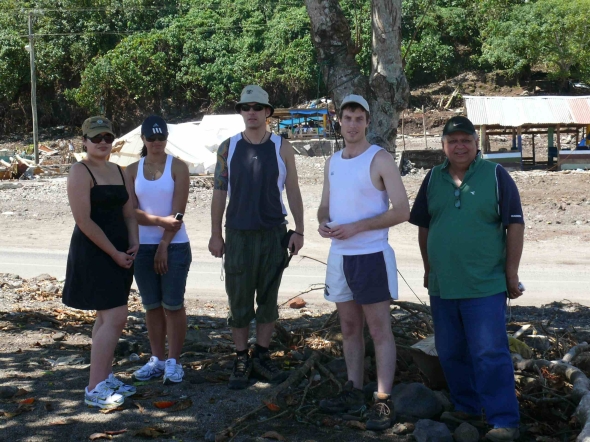NZ Engineers Predict Years for Samoa To Recover; High Stress & Anxiety Among Male Tsunami Survivors
Posted: November 17, 2009 Filed under: Analysis, Breaking News, Business, Community, Current, Earthquake Tsunami Samoa/AmSampa 09, education, Environment, NZPacific, South Pacific Region | Tags: aleipata., anxiety, Breaking news tsunami, Community, depression among tsunami survivors, disaster, earthquake, Emergencies And Disasters, engineers in samoa, Engineers without Boarders, high stress among survivors, James Beckett, James Rotimi, Kelvin Zuo, lalomanu, Natalia Palamo, natural disaster, nz engineers, nz pacific community, poutasi, rebuilding samoa, Regan Potangaroa, Resilient Organisations Group, Saleapaga, samoa tsunami, south coast samoa, South Pacific Engineers, strength, University of Auckland, university of auckland engineers, Upolu, veronika maka, Village, weather 3 Comments
NZ Engineers surveying the damage in the village of Lepa, South Coast of Upolu Samoa. At the far right (green shirt) is Dr Regan Potangaroa who led the group. Photo courtesy of University of Auckland.
As part of a professional body named Resilient Organisations Group, New Zealand engineer Regan Potangaroa led a team of volunteers from the University of Auckland, Engineers without Boarders, and South Pacific Engineers to support the disaster response and recovery effort in Samoa following the recent earthquake-triggered tsunami of Tues 29th September. It destroyed and devastated the South Coast villages of Upolu Samoa, American Samoa and Niuatoputapu with the official death toll close to 200.
By Danelle Clayton
A group of University of Auckland engineers who visited Samoa to assess reconstruction needs after the tsunami say it could take up to six years for the nation to fully recover.
The findings from the Resilient Organisations Group, based at the Faculty of Engineering, were presented at The University of Auckland on Monday night (9 November). The presentation covered the impact of the recent tsunami on Samoa and opportunities for future research and assistance.
The group was also concerned with the social impacts of the tsunami. They conducted a baseline quality of life survey to help them monitor how villagers were coping. They found high incidences of depression and anxiety, particularly among men, and those in the 40-49 age bracket.
The Resilient Organisations Group, who toured the South-easterrn parts of Upolu in mid-October to survey tsunami damage, is made up of a group of six academics, PhD and undergraduate engineering students from University of Auckland, Engineers Without Borders and South Pacific Engineers.
Among them was third year Samoan engineering student, Natalia Palamo, who helped the group make connections on the island. “You really don’t understand how bad the damage is until you see it for yourself. It was much worse than I expected,” Natalia said.
Dr Regan Potangaroa, who led the group, described a “scorched” landscape in the worst affected areas, with all buildings and trees wiped out. He said a key observation was many villagers were undecided on whether they would “stay or go”, and that could cause significant complications to the recovery effort.
“If you don’t know where people are going to be, then how can you know where to rebuild facilities like schools. Nobody has thought about that yet,” said Regan who is based at Unitec as an Associate Professor at the School of Architecture.
Regan Potangaroa, Veronica Maka, Stuart Mitchell, Prime Minister of Samoa, James Beckett, Natalia Palamo and Kelvin Zuo.”]
The group has made design recommendations on how to quickly rebuild fales in time for the cyclone season, using prefabrication methods. They also want to develop user manuals so future modifications can be made to the fale design, and are looking at the design of low-cost early warning systems for earthquakes and tsunamis. They also recommended coastal villages identify clear escape paths.
Regan says the research is not just about helping Samoa, but using the knowledge from the tragedy to better respond to any future disaster in the Pacific region.
He emphasised New Zealand’s special relationship with Samoa and acknowledged the hospitality he was given by the Samoan Prime Minister and Deputy Prime Minister, the Institute of Professional Engineers Samoa, and the National University of Samoa, during the visit.
The group plans to return to Samoa in the New Year.
Editor’s Note: Resilient Organisations (ResOrgs) is a multi-disciplinary team of 17 researchers and practitioners that is New Zealand based and with global reach. A collaboration between top New Zealand research Universities and key industry players, ResOrgs is funded by the NZ Foundation for Research, Science and Technology and supported by industry partners and advisors.
Among the team who went to Samoa, James Rotimi, Kelvin Zuo and James Beckett are postgraduate students researching post-disaster reconstruction issues as part of the Resilient Organisations research programme.
Veronica Maka, a graduate from the University Auckland’s Faculty of Engineering, now works for engineering firm GHD. As a university student, she was president of the South Pacific Indigenous Engineering Society (SPIES).
Source: Resilient Organisations


Your Words